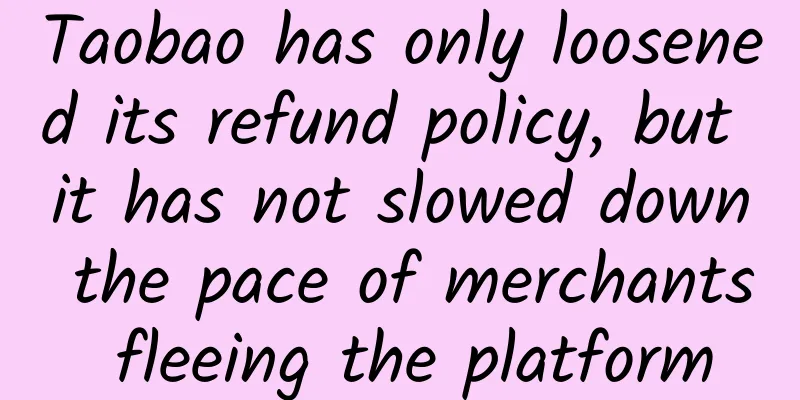Taobao has only loosened its refund policy, but it has not slowed down the pace of merchants fleeing the platform

|
Platforms, merchants and consumers have jointly built a huge e-commerce market in my country with a scale of over 50 trillion yuan. However, the discussion on the relationship between the three parties is still inconclusive. In most cases, merchants and consumers are in a game relationship, and the platform is the rule maker and executor, coordinating the interests between the two. After Taobao gradually lost its leadership position in the e-commerce field, the balance of rights and interests is accelerating towards consumers. A large number of new regulations are driving platform merchants to compete with each other frantically, triggering a new round of store closures. Taobao was the last mainstream e-commerce company to introduce a "refund only" policy. Although the new regulations to correct the situation have been implemented, they do not seem to have stopped merchants from fleeing. Only refunds, anxiety from giantsThe rapid tilt of the buying and selling balance towards consumers was previously interpreted by the outside world as Taobao's systematic self-rescue measure. According to the official financial report data, Alibaba's net profit in the first quarter of 2024 was only 919 million yuan, a year-on-year drop of 96%. On May 23, 2024, after Pinduoduo released its financial report, its market value once climbed to US$204.2 billion, officially surpassing Alibaba. Now that the e-commerce bonus period has long passed, how to further improve services and win over consumers has become the "prescription" Taobao has prescribed for itself. But this move undoubtedly further squeezed the profit margins of merchants. Taking the refund-only policy as an example, after receiving the goods, users do not need to return them, they only need to apply for a refund to get support from the platform. This service is designed to simplify the refund process, reduce users' waiting time and communication costs, and improve users' shopping experience and trust. However, this service also has some drawbacks, such as malicious "refund only", unfair platform penalties, and difficulties for merchants to protect their rights, which have caused losses and troubles to merchants operating normally. Therefore, after launching the refund-only policy at the end of 2023, Taobao experienced a wave of merchant closures. At that time, the search for the term "Taobao store transfer" in Baidu Index reached a peak. Only the refund policy is corrected, it looks goodE-commerce platforms cannot exist without merchants. Data shows that during the 618 shopping festival in 2024, the transaction volume of 1.9 million small and medium-sized merchants increased by more than 100% year-on-year, and they are still the backbone that cannot be ignored. Therefore, Taobao issued new regulations last month, announcing that it would optimize the refund-only strategy, enhance merchants’ after-sales autonomy based on the new experience points, and reduce or cancel after-sales intervention for high-quality stores. This policy has been officially implemented recently, but small and medium-sized businesses do not seem to be buying into it. The main content of Taobao's optimization of the "refund only" strategy is to give merchants more autonomy based on the experience points of stores and products, reduce or cancel the direct intervention of the platform, and balance the rights of consumers and the interests of merchants. Specifically, for merchants whose comprehensive store experience score is ≥4.8, the platform will not actively intervene through Wangwang and support refunds only after receipt of goods, but will encourage merchants to negotiate with consumers first. These merchants can choose whether to accept the "refund only" application or provide other after-sales solutions, such as exchange, compensation, etc., based on their own circumstances. If the merchant and the consumer cannot reach an agreement, the consumer can still apply for the platform to intervene, and the platform will make a fair judgment and handle it based on the actual situation of the goods. For merchants whose comprehensive store experience scores are between 4.6 and 4.8, the platform will divide them into different risk levels based on the categories and attributes of the goods, and conduct limited intervention, such as limiting the amount and number of "refunds only" or requiring consumers to provide relevant evidence and reasons to support the application for "refunds only". For merchants whose comprehensive store experience score is lower than 4.6 points, the platform will continue to maintain full support for the "refund only" service, actively intervene through Wangwang, and support refund only after receipt of goods, to protect consumers' rights and experience. It seems very good. Merchants only need to work hard to improve service levels and product quality and enhance experience scores to go beyond refund policies, while consumers' experience is fully guaranteed. However, some merchants pointed out that achieving a score of 4.8 is almost an "impossible task", and the new regulations have optimized the "loneliness". In the Ali Qianniu merchant workstation, the store experience score is comprehensively evaluated from three dimensions: product experience, logistics speed, and service guarantee in the last 30 days. It is not easy to achieve a high score in each of them. For example, the product experience score is strongly correlated with the "first product return". The so-called first product push is an order where the consumer initiates a refund and the first time the refund is due to product quality. Even if there is no problem with the product quality, it is common for consumers to choose "quality problem" as the reason for return, because this can avoid the return shipping fee. However, the irrationality of the system lies in the fact that even if the merchant negotiates with the consumer and the consumer changes the reason for return, the number of first-time returns will not change. This greatly increases the first-time return rate and increases the difficulty of improving the experience score. There are some "wool-pulling parties" on every e-commerce platform who rely solely on refunds to make profits, such as the "wool-pulling parties" on Taobao. They can easily lower the store experience score through the first product returns. After the experience score drops to 4.8 points, they can bypass the merchants and only refund the "wool-pulling parties", and the merchants can hardly resist. Therefore, the so-called Taobao policy of refunding only is only a "relaxation" for a very small number of top-quality merchants, and it is not effective for merchants with experience scores below 4.8. Small and medium-sized merchants still have to face the pressure of funds, goods, and manpower brought by refunding only. Compared with the adjustment of the refund policy alone, many merchants are more concerned about the "Notice on the Change of Taobao's Implementation Rules on Breach of Commitment" announced by Taobao on July 15. The new rules have many fine details and the conditions are almost harsh. For example, if you do not reply to a message within 3 minutes between 8 a.m. and 11 p.m., you will be fined 20 yuan. In addition, if negative reception behaviors such as mechanically repeating answers, answering irrelevant questions, responding negatively, and having a rude attitude lead to buyer dissatisfaction, Taobao will support the seller to compensate the buyer at a price of 20 yuan per order. The rule quickly spread among merchants. On the one hand, the 180-second After an outcry from the public, Taobao officially deleted the specific time provision that “compensation is required if the reply time exceeds 180 seconds”, but the corresponding clauses were retained. Many businesses responded that they have received a lot of strange questions recently, and after the business responded in time, there was no follow-up, which seemed to be an attempt to defraud compensation. Some businesses also said that they were indeed deducted 20 yuan for not responding in time. It is obviously difficult for merchants to support the practice of squeezing merchants' profit margins to improve consumer experience. After weighing the pros and cons, more and more Taobao shop owners choose to close their shops and leave, including many 10-year-old and gold-crown shops. SummarizeTaobao was once a trend-setting giant in the e-commerce industry, but now faces many challenges. The adjustment of Taobao's refund policy is like a stone thrown into a lake, which has caused ripples but failed to stop merchants from fleeing. What is reflected behind this is the complex and delicate relationship between the platform, merchants and consumers. Taobao quickly tilted the balance towards consumers, which was interpreted as Alibaba's self-help measure, but this move has squeezed the profit margins of merchants to a certain extent. The refund policy alone seems to be aimed at improving services and winning over consumers, but due to the drawbacks of malicious refunds and unfair penalties, it has caused losses and troubles to merchants. The wave of store closures triggered by the introduction of this policy at the end of 2023 was a strong signal of dissatisfaction from merchants. The relationship between merchants and consumers is not a zero-sum game, but a mutually dependent one. The platform needs merchants to provide a variety of products and high-quality services to attract consumers; consumers' purchasing behavior brings profits to merchants and also brings traffic and revenue to the platform. However, when the platform is overly biased towards consumers, the interests of merchants are harmed and they may choose to leave the platform, which will lead to a reduction in the variety and quantity of goods on the platform, affect consumers' shopping choices, and ultimately lose the favor of consumers. As competition in the e-commerce industry becomes increasingly fierce, Taobao needs to re-examine its policies and find a balance between the platform, merchants and consumers. On the one hand, it is necessary to strengthen the education of consumers and guide them to reasonably use policies such as refund-only to avoid malicious refunds; on the other hand, it is necessary to optimize the platform's penalty mechanism to ensure fairness and justice and protect the legitimate rights and interests of merchants. At the same time, the platform can also create a good business environment for merchants through technical means, such as strengthening the crackdown on "wool parties", improving the intelligence level of the system, and reducing misjudgments. Only when the platform, merchants and consumers work together can the sustainable development of the e-commerce industry be achieved. As an important participant in the e-commerce industry, Taobao should shoulder its responsibilities, actively explore innovations, and provide more support and guarantees for merchants while protecting the rights and interests of consumers. Only in this way can it remain invincible in the fierce market competition and achieve a win-win situation for all three parties. As a winner of Toutiao's Qingyun Plan and Baijiahao's Bai+ Plan, the 2019 Baidu Digital Author of the Year, the Baijiahao's Most Popular Author in the Technology Field, the 2019 Sogou Technology and Culture Author, and the 2021 Baijiahao Quarterly Influential Creator, he has won many awards, including the 2013 Sohu Best Industry Media Person, the 2015 China New Media Entrepreneurship Competition Beijing Third Place, the 2015 Guangmang Experience Award, the 2015 China New Media Entrepreneurship Competition Finals Third Place, and the 2018 Baidu Dynamic Annual Powerful Celebrity. |
Recommend
Yizhuo.com’s product removal phone number is unreachable: the money-burning model of fresh food e-commerce is difficult to sustain
During this period, Ms. Liu, a citizen, found tha...
Who is the mysterious boss who exploits the “working people” in “Chinese Tales”?
Earlier this year, the animated series "Chin...
Xiaomi Note: A touchstone for Xiaomi’s entry into the mid-to-high-end market
Although I had a hunch that Xiaomi would not rele...
There are 43 world intangible cultural heritage items from China. Do you know these intangible cultural heritage items?
Science Fiction Network, December 2 (Xu Mingyang)...
How to control costs in the four stages of an activity?
This article is part of the “Ideology of Top Even...
Latest | Data rankings of 56 mainstream information flow advertising platforms!
The following is the latest traffic ranking of 56...
Gold and Silver Mistakes: The Most Beautiful Mistakes Across Thousands of Years
Gold and silver inlay, also known as inlay of gol...
Case Analysis | WeChat Reading VS Douban Reading, social ecology or original platform?
As a heavy user of reading apps, the author succe...
It’s just a piece of paper. What’s so special about Sony’s DPT-RP1 e-paper?
In today's era, information technology has ex...
A complete list of Android app markets and app package names!
During the development process, you may encounter...
The opening rate is less than 5% and the number of fans is showing negative growth. How can corporate official accounts stand out?
A quarter of 2017 has passed, and many corporate ...
It turns out that the "+" sign in the upper right corner of WeChat has so many hidden functions. Learning them is a great way to gain knowledge.
1. Query the disappeared group After using WeChat...
This type of shoes is most common in winter, and it is easy to get hurt if you choose the wrong one! Selection Guide →
When it comes to snow boots, many girls must have...
Tips and strategies for becoming a “super user”!
The free feast on the Internet is becoming a thin...
3500 words in-depth analysis: community operation monetization
Community marketing is suitable for products with...









